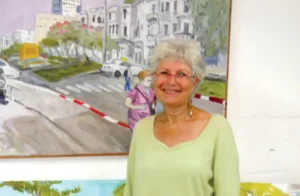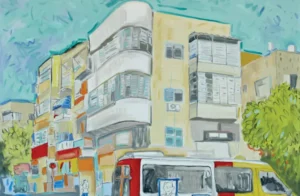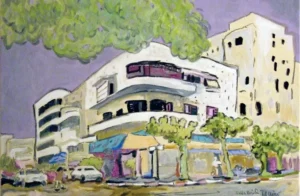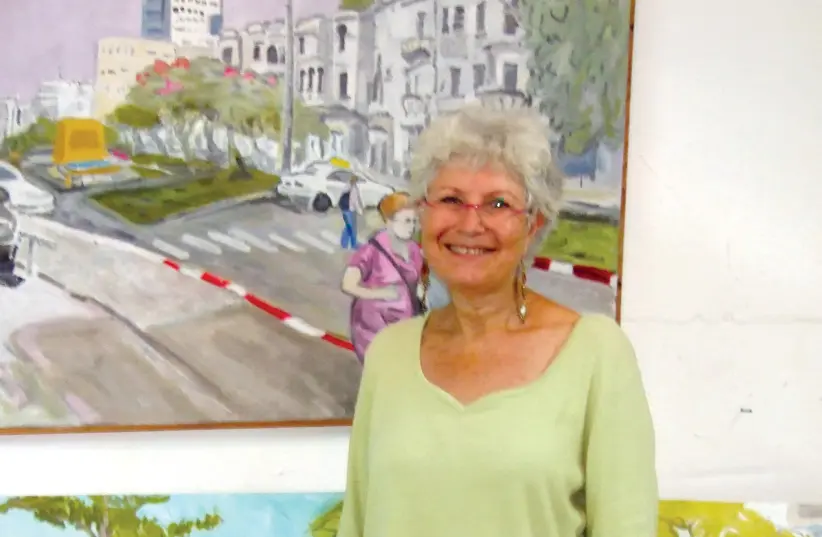While her cartoonist husband may be more famous, her striking paintings have been exhibited around the world.

Already at the entrance to Sali Ariel’s home in Herzliya Pituah, you discover the walls of the house are full of paintings that she created over the years. In the short walk from the doorway to the living room, you are exposed to many spectacular works of art, full of color, in different styles, with motifs of dogs and horses, Bauhaus buildings, and beaches in Tel Aviv and Herzliya.
Ariel’s life story is as colorful as the paintings she draws. She was born in Arkansas. She absorbed her love for art from a young age at home, when she played with the paints of her mother, who was a painter and ceramic artist. She studied art and drawing at university, first at Washington University in St. Louis and then at Cooper Union in New York and at The Art Students League.
At university she met and became involved with a group of yippies – hippies who worked and paraded for human rights and against the Vietnam War, with a sense of fun and TV exposure.
Ariel came to Israel for the first time in August 1967 after the Six Day War, when she was 20, about two weeks after marrying her first husband. Between 1968 and 1971 they divided their time between New York and Israel.
An interesting life with interesting friends
Ariel tells me that she and her husband had many interesting friends in Manhattan such as Bob Dylan, who lived nearby and used to visit them almost every day in their one-room apartment. He would play her old guitar from high school and play chess and backgammon with her husband while Ariel videotaped them. Dylan introduced them to John Lennon and Yoko, and also Peter, Paul and Mary. She also knew Andy Warhol, Abbie Hoffman, Jerry Rubin and more. But they were much closer with Dylan than the others. With her portable video camera, Ariel shot short reality films all over New York City with Dylan.

In the late seventies, after her divorce, Sally moved to the Sha’ar HaGai farm and kennel, where together with four other women she raised about 100 dogs of the Canaan breed that were trained to be guard dogs in the IDF. In addition to the farm, there were also horse stables where Ariel taught riding. She had a background in training and riding show horses from her student days.
Living conditions on the farm were extremely basic, and there was no electricity. Since Ariel worked outside for most of the daylight hours and in the dark of the evening, she had to find creative solutions to continue and practice her love of painting, such as using shiny silver paint and black and white so she could see it well in the lantern light.
The three years of living on the farm influenced Ariel, and she often combines characters of dogs and horses in her work. That she had limited her colors due to the candle-lit living conditions also influenced her and her painting, to this day.
In 1992, Ariel and her second husband, Yaakov Kirschen, the well-known Dry Bones cartoonist, moved to the Florentin-Shenkin area of Tel Aviv. The public bomb shelter in Gan Meir served as her studio for about nine years, until she had to evacuate it due to the Gaza War.
During this period, she started drawing Tel Aviv buildings in the style of the Bauhaus, and when I mention to her that I also see dogs in the paintings, she laughs and answers that her shelter-studio was under the dog park, and she loved to look at them and to incorporate them in her painting.
Following the move from Jerusalem to Tel Aviv – and her leaving most of her friends in Jerusalem – she joined the International Women’s Club (IWC) in order to meet new friends. Ariel has been a member of this organization ever since, and even served as the organization’s president.
Her paintings hang in homes in countries around the world, as many of the ambassadors who come to Israel buy her paintings to remind them of the time they served here. Sometimes their purchase is accompanied by a funny story, like when an ambassador bought a painting of Tel Aviv and took it to the next country he moved to after Israel. Since it was Saudi Arabia, he couldn’t hang the painting in the living room and had to hang it in the bedroom instead.

Ariel’s works have been presented in countless exhibitions around the world, from Singapore to her native US and Switzerland, and of course in galleries in Jaffa, Tel Aviv and Jerusalem. Today, about 30 of her paintings are on display at the Deputy US Ambassador’s residence in Herzliya.
You can get more information on her painting on her website, www.saliariel.com, and contact her at saliariel@yahoo.com. ■
This is an edited translation of an article that first ran in Alef-Bet magazine in Hebrew (May 2022) and is reprinted with kind permission.

